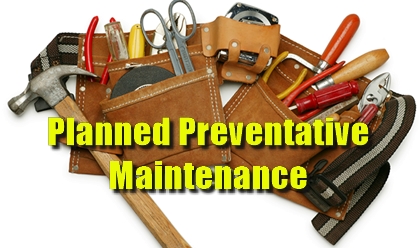Don’t spoil the ship for a ha’pworth of tar! Just as “clean as you go” is an important habit to develop so is spending regular, small amounts of money on repairs. It is much better for a building and your equipment (and more cost effective), than large injections of capital every 10 or 20 years or so.
Many people think that once a pub has been ‘refurbished’ it doesn’t need to be looked at again for many years. Many major repairs to your pub can been prevented if simple things like leaking down-pipes and gutters are cleaned out or repaired quickly.
What is maintenance?
Maintenance is defined as “the continuous protective care of the fabric, contents and setting of a place or equipment”. Maintenance can be broken down by why and when it happens:
Corrective maintenance is the work necessary to bring a building to an acceptable standard (often as demanded in a lease or a landlord’s Schedule of Dilapidations or a Schedule of Condition as prepared by a surveyor) such as treatment for rising damp.
Planned maintenance are works to prevent failure which recur predictably within the life of a building (or your tenure), such as cleaning gutters or painting and decorating.
Emergency corrective maintenance are the works that must be carried out immediately for health, safety, security reasons or that may result in the rapid deterioration of the structure or fabric if not undertaken (for example, roof repairs after storm damage or repairing broken windows).
Building maintenance can also be broken down according to who carries out the maintenance work: primary maintenance that you (or your staff) carry out and secondary maintenance carried out by external contractors such as plumbers, roofers, chippies etc.
Equipment and plant (boilers, cellar cooling systems) installed within a pub also need routine servicing and the replenishment of consumables (for instance “gassing up bottle coolers”) to keep them in working order. They usually have specific servicing and maintenance requirements which are provided through a service contract, often with the original supplier of the equipment.
Why have a maintenance plan?
The main reason for a maintenance plan is that it is the most cost-effective way to maintain the value of an asset (whether you or your landlord owns that asset).
The advantages of a plan are the property/equipment is organised and maintained in a systematic way, rather than “nilly-willy”. Building services (such as central heating) can be monitored to assist their efficient use; the standard and presentation of the property can be maintained (essential for every pub); subjective decision making and emergency corrective maintenance are minimised (as these are usually the most costly types of repair).
When buildings or equipment are neglected, faults can occur which may result in extensive and avoidable damage to your pub’s fabric or equipment. Neglect of maintenance can also give rise to fire and safety hazards, which could result in you being found legally and financially liable for any injuries and/or other losses.
